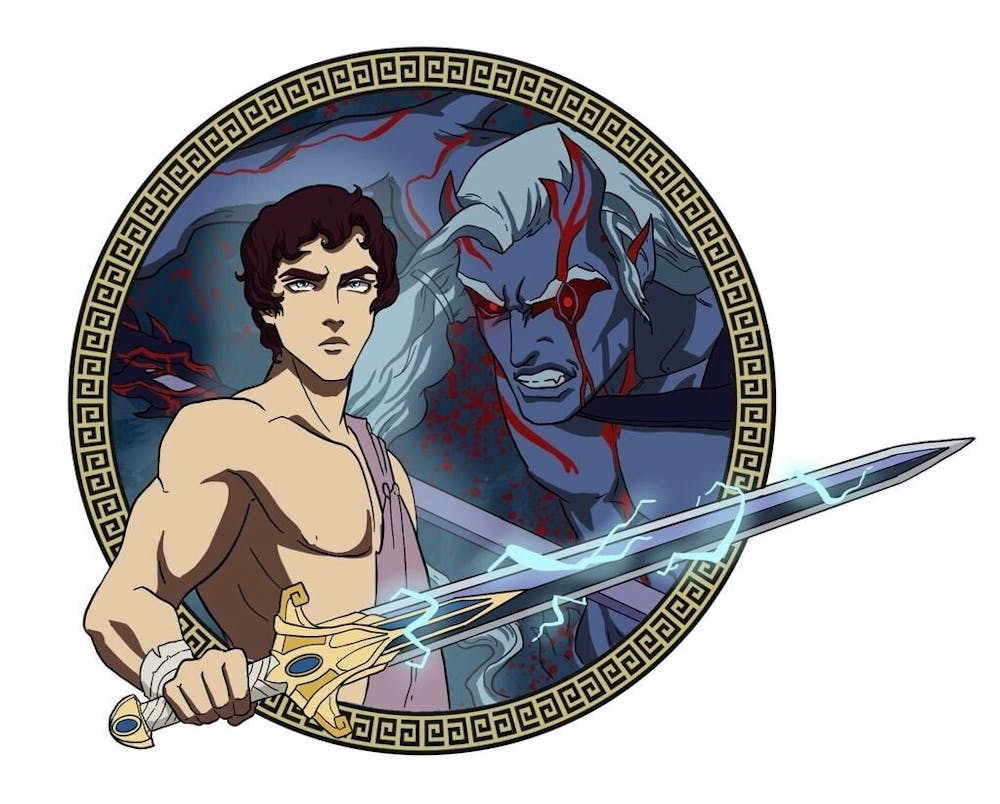Netflix’s Blood of Zeus debuted on Oct. 27, perfectly coinciding with Halloweekend, and giving me the horror and Greek mythology kick I didn’t know I was craving. The series was created by Charley and Vlas Parlapanides, Greek–American brothers whose previous writing credits Clash of the Titans and The Immortals attempted to reboot Greek mythology for an American audience to varying degrees of success. However, their latest foray into the genre—although empty in terms of plot and character development—is visually exhilarating in its decision to recount a supposed lost myth rather than retell an established tale.
The series centers around a young hero named Heron (Derek Phillips) who discovers he's the illegitimate son of Zeus (Jason O’Mara). This angers Hera (Claudia Christian) and the other gods are frustrated by Zeus’ inability to “keep it in his pants”—and, by extension, his leadership abilities. Soon, Heron finds himself at the epicenter of a war between different factions of the gods, the giants, and Heron’s own sadistic, villainous twin brother, Seraphim (Elias Toufexis).
The show is a deliciously violent and fantastic addition to the genre of American anime, which makes you wonder why Americans hadn't thought to reboot Greek mythology before—aside from live–action movies or Hercules. Of course, in terms of plot, many creative liberties are taken, so much so it will make classists shiver. The story itself is a "lost myth," meaning the show's creators can do virtually anything under the scope of Greek mythology. That said, some plot points, like Zeus' fate or his own marriage problems with Hera, may be difficult for people to grasp. Still, all in all, the creators treat this balance between fiction and retelling delicately, successfully paying homage to Greek mythology while reinventing it.
On the surface, Heron’s story appears to be an amalgamation of typical heroic tropes. However, there are many other compelling storylines which transform the series’ premise into something deeper. Particularly, the crumbling of Hera and Zeus’ marriage as a consequence of Zeus’ adultery are an interesting take on the Olympians’ dysfunctional marriage. In this version, Hera takes charge and forces her husband to face the consequences of his actions. She manages to turn half of Olympus against him, and she even forms a plot to overthrow her husband from power to take over, giving agency to a figure who is often the victim of patriarchal Greek society.
Along with that, the very story of the war between the giants and the gods—which is seldom covered in Greek mythology due to lost accounts—is revived when Heron must face off against the demons spawned from the body of one of the giants. Despite the puzzling summary, the show does a particularly great job of laying out the story, accompanied by dazzling animation.
The show's style is what particularly stands out. The characters themselves are drawn in an ethereal manner, something you’d expect to find on a mosaic or an ancient statue. The tints of gold and the hues of purple and blue adds to the godly, supernatural elements of the series. Episodes culminate in breathtaking, exaggerated battle scenes that hold nothing back when it comes to body counts and grandiose climaxes. These scenes are accompanied by an outstanding score that utilizes a majestic chorus and orchestra which only adds to the epic nature of the show. It’s clear the creators and animators chose a very experimental approach to their animation—one that works in their favor and gives the show a strong voice, even if lacks character development.
Although the plot is very exciting and tightly–packed into eight episodes, the show falters in its character development, particularly of the gods and warriors that accompany Heron in his journey. They're all very one–note and don’t offer much beyond simply being plot devices or having exaggerated deaths in battle (Seriously, so many people die). I was particularly left wanting more from Alexia (Jessica enwick), an Amazonian princess who assists Heron in his battle against the demons. There isn’t much to her character or motivations, except that she’s meant to act as a pretty side piece to Heron. Speaking of, their romantic relationship essentially comes out of nowhere. It's a massive waste of talented voice actress Jessica Henwick, whose other credits include Iron Fist and Game of Thrones.
However, it almost doesn’t even matter. The show opts to showcase its strengths in its aesthetics and style, delivering an original, animated series that makes me very excited for the direction Netflix and its adult animation output is headed.
Grade: B+

